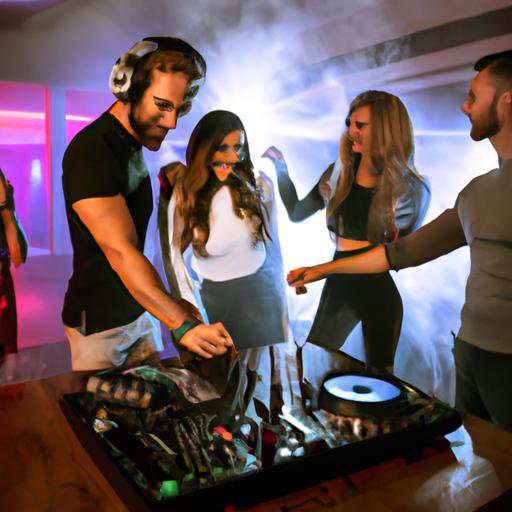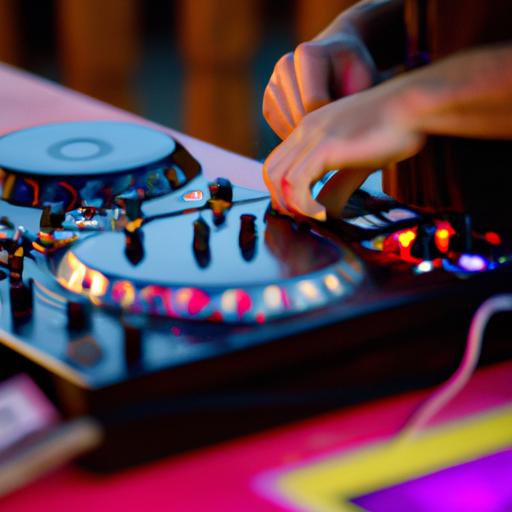DJ Setup for Beginners: A Comprehensive Guide
Are you an aspiring DJ who wants to level up your skills with a professional DJ setup? Look no further! Starting out as a beginner can be daunting, with so many choices and equipment options to consider. However, having a solid DJ setup is crucial for success in the industry.
So, what exactly is a DJ setup? It consists of essential equipment that allows DJs to mix and produce music. From turntables or DJ controllers to headphones and speakers, a good DJ setup is a must-have for any beginner looking to elevate their skills.
But why is a good DJ setup so important for beginners? Well, it can help you produce high-quality music, attract more clients, and secure more gigs. Additionally, it sets you apart from the competition and establishes you as a skilled and experienced DJ in the industry.
In this comprehensive guide, we’ll cover everything you need to know about setting up your DJ equipment, choosing the right gear for your needs, and maintaining your equipment for optimal performance. Let’s dive in!
Essential Equipment for Beginner DJs

As a beginner DJ, investing in essential equipment is crucial for producing top-notch music and establishing yourself in the industry. Here are the essential items you’ll need for your DJ setup:
Turntables or DJ Controller
Turntables are the classic choice for DJs, but a DJ controller offers a more modern and convenient option. A DJ controller allows you to mix music using software on your laptop or computer, making it an excellent choice for beginners.
Mixer
A mixer is a vital piece of equipment that enables you to balance and adjust the volume and EQ of different tracks. It’s essential for creating seamless transitions between songs and producing smooth mixes.
Headphones
Professional-grade headphones are a must-have for any DJ. They allow you to preview tracks and make adjustments to the mix without affecting the live sound. Look for headphones that offer a comfortable fit, excellent sound quality, and noise isolation features.
Speakers
Investing in high-quality speakers is crucial for producing excellent sound quality and filling the room with music. Look for speakers that are sturdy, portable, and deliver clear and accurate sound.
Cables and Adapters
Cables and adapters are necessary for connecting your equipment and ensuring everything works seamlessly. Invest in high-quality cables to prevent interference and ensure top-notch sound quality.
Laptop or Computer
A laptop or computer is necessary for using DJ software and storing your music library. Invest in a powerful and reliable device to avoid technical issues during performances.
By investing in these essential pieces of equipment, you’ll be well on your way to building a professional and high-quality DJ setup.
Setting up Your DJ Equipment
Whether you’re a beginner or an experienced DJ, setting up your DJ equipment correctly is crucial for optimal performance. Follow these steps to ensure that your equipment is set up correctly:
Choosing the Right Location
The first step in setting up your DJ equipment is selecting the right location. Consider the following factors when choosing a spot:
- Space: Make sure you have enough room to set up your equipment comfortably and move around freely.
- Lighting: Ensure that the lighting is sufficient for you to see your equipment and controls clearly.
- Power: Make sure you have access to a power source for your equipment and any other devices you may need.
Connecting the Equipment
Once you’ve chosen the right location, it’s time to connect your equipment. Follow these steps:
- Connect your turntables or DJ controller to your mixer.
- Connect your mixer to your speakers.
- Connect your headphones to your mixer.
- Connect your laptop or computer to your mixer if you’re using one.
Ensure that all connections are secure and that there are no loose cables or wires.
Calibration and Testing
After connecting your equipment, calibrate and test it to ensure optimal performance. Here’s how:
- Set the gain on your mixer to achieve consistent audio levels.
- Adjust the EQ on your mixer to achieve a balanced sound.
- Use your headphones to monitor your audio output and ensure consistent levels.
Play some music and listen to the output through your speakers and headphones. Make any necessary adjustments until you’re satisfied with the audio quality.
By following these steps, you can ensure that your DJ equipment is set up correctly, calibrated, and ready for your next gig.
Tips for Choosing the Right DJ Setup for Beginners
Choosing the right DJ setup as a beginner can be overwhelming, given the abundance of options available. However, considering a few essential factors can help you make an informed decision and invest in the right equipment for your needs.
Budget Considerations
Before investing in a DJ setup, consider your budget. DJ equipment can be pricey, but there are options available at various price points. Determine how much you’re willing to spend and research equipment within your budget range. Remember, high-quality equipment is essential for producing top-notch music, but that doesn’t mean you have to break the bank.
Music Genre
Different music genres require different equipment. For example, if you’re interested in mixing electronic dance music (EDM), you’ll need a setup with a high-powered sound system and subwoofers. On the other hand, if you’re into mixing hip-hop or R&B, you’ll need a setup with a powerful bass and midrange. Consider the type of music you’ll be playing and research equipment best suited for your genre.
Portability and Ease of Use
If you plan on performing at different venues or events, portability is crucial. Look for lightweight and easy-to-transport equipment. Also, consider ease of use. As a beginner, you’ll want equipment that is user-friendly and straightforward to operate. Avoid overly complicated setups that may hinder your learning and performance.
By considering these factors, you can choose the right DJ setup for your needs and set yourself up for success as a beginner DJ.
Maintenance and Care for Your DJ Equipment
Understanding how to maintain and care for your equipment is essential to ensure it lasts for years to come. Neglecting your equipment can lead to costly repairs or replacements, hindering your progress and success as a DJ. Here are some tips for maintaining and caring for your DJ equipment:
Cleaning and Maintaining Your Equipment
Regular cleaning and maintenance can extend the life of your DJ equipment and improve its performance. Dust and debris can accumulate on the surface of your equipment, causing malfunction or deterioration over time. After each use, use a microfiber cloth to wipe down your equipment, paying close attention to buttons, knobs, and sliders.
Keep your equipment free from moisture and humidity. If you’re performing in a humid environment, consider using a dehumidifier or storing your equipment in a dry place. Additionally, avoid exposing your gear to direct sunlight or extreme temperatures, as this can damage internal components.
Replacing Faulty Parts
Despite your best efforts, DJ equipment can malfunction or break down over time. When this happens, promptly replace faulty parts to prevent further damage. If you’re not comfortable replacing parts yourself, consider taking your equipment to a professional for repairs.
Protecting Your Equipment from Damage
Protecting your equipment from damage is crucial for its longevity. Invest in protective cases or covers for your gear when not in use or during transport. Additionally, avoid placing drinks or other objects on your equipment, as spills or damage can occur.
By following these tips for maintaining and caring for your DJ equipment, you can ensure that it’s always in top condition, allowing you to focus on your music and achieve success as a beginner DJ.
Conclusion
In conclusion, a good DJ setup is essential for any beginner looking to make a mark in the industry. By investing in high-quality equipment, you can produce professional-level music, attract more clients, and establish yourself as a skilled and experienced DJ.
Remember to choose the right location, connect your equipment correctly, and calibrate and test your gear for optimal performance. Take into account factors like your budget, music genre, and portability requirements when choosing the right DJ setup for your needs.
Lastly, don’t forget to maintain and care for your equipment properly. Regular cleaning, prompt replacement of faulty parts, and protection from damage will ensure your DJ setup lasts for years to come.
Building a successful DJ career takes time, dedication, and hard work. But with a good DJ setup and the right skills, you can achieve your goals and make a name for yourself in the industry. So, what are you waiting for? Start building your dream DJ setup today!

